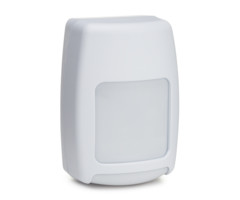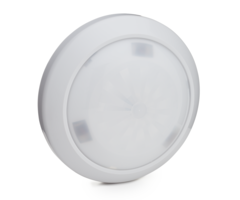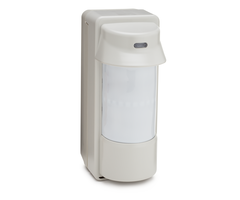Will Curtain Movement Set off Infrared Motion Sensors?
All objects, unless they exist at a temperature of absolute zero (-459.67°F) emit infrared energy. Passive InfraRed (PIR) motion detectors work by sensing changes in this IR energy. They do this using a Pyro Electric Infrared sensor, and a fresnel (pronounced fruh-nell) lens.
A fresnel lens has a pattern, which breaks up the view of IR energy into smaller pieces, sometimes called zones, or fingers. The IR sensor views the covered area through these zones, and when it senses a change in IR energy which passes over multiple zones, it triggers a motion alarm. This is why, although your sofa emits IR energy, it doesn't set off the motion detector, because it doesn't move. Which brings us to the curtains.
Curtains, advertising materials, balloons, and window blinds are all examples of inanimate objects that can move due to external forces, such as forced air furnaces, or central air conditioning systems. Because these objects emit IR energy, if they move enough within the field of view of a PIR motion detector, they will cause an activation when the system is armed, and the motion is not bypassed. Below is an image of the detection pattern for the Honeywell IS3035, a commonly used PIR motion detector. Looking at this information, it seems like it is indicating that IR energy is sent OUT from the motion detector, but in fact, it's showing the pattern of IR energy entering the lens. Passive InfraRed means the device is completely passive, it emits nothing. The small red circle shown below indicates the Pyro Electric sensor, and the zones, or fingers you see are the paths of energy as they enter through the fresnel lens.

When it comes to PIR motion detectors, there aren't a lot of adjustment options. You can adjust with mounting height, lens masking, and in some cases, you can set a pulse count which is either more or less sensitive. For this reason, it's very important to read and follow all instructions when mounting any PIR. Motions with a pet immunity feature will have specific requirements that must be strictly adhered to in order to take advantage of the pet immunity feature. In the end, you must thoroughly walk test any PIR to be sure it is properly mounted, and adjusted prior to putting the system in service.
Did you find this answer useful?
We offer alarm monitoring as low as $10 / month
Click Here to Learn MoreRelated Products








Related Categories
- Motion Detecting Sensors
- Wireless Motion Detecting Sensors
- Pet Friendly Motion Detecting Sensors
- Passive Infrared Motion Detecting Sensors
- Wired Motion Detecting Sensors
- Honeywell Six Motion Detectors
- Answered
- Answered By
- Julia Ross





